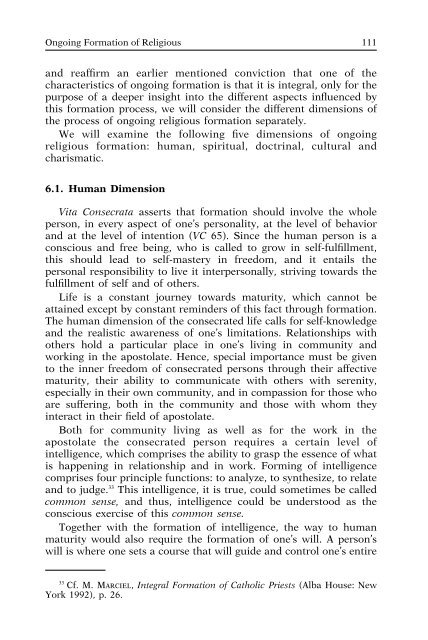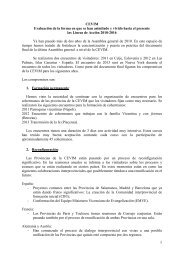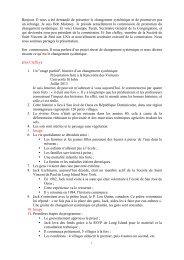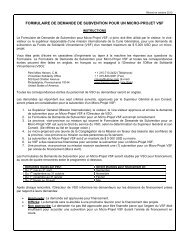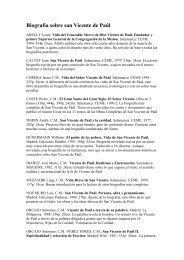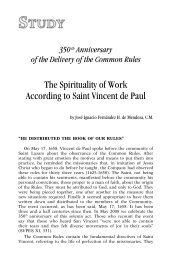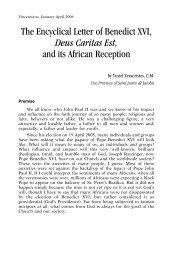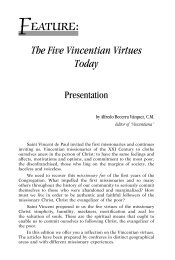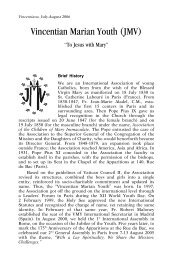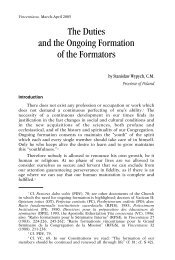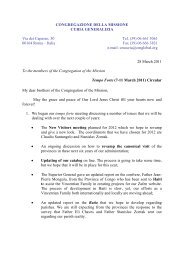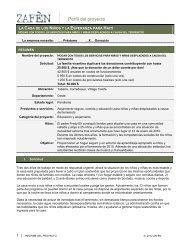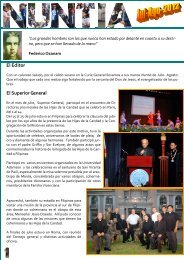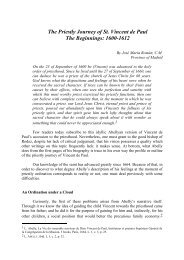Ongoing Formation of Religious - CMGlobal
Ongoing Formation of Religious - CMGlobal
Ongoing Formation of Religious - CMGlobal
Create successful ePaper yourself
Turn your PDF publications into a flip-book with our unique Google optimized e-Paper software.
VINCENTIANA 1/2-2008 - INGLESEApril 17, 2008 − 4ª BOZZA<strong>Ongoing</strong> <strong>Formation</strong> <strong>of</strong> <strong>Religious</strong>111and reaffirm an earlier mentioned conviction that one <strong>of</strong> thecharacteristics <strong>of</strong> ongoing formation is that it is integral, only for thepurpose <strong>of</strong> a deeper insight into the different aspects influenced bythis formation process, we will consider the different dimensions <strong>of</strong>the process <strong>of</strong> ongoing religious formation separately.We will examine the following five dimensions <strong>of</strong> ongoingreligious formation: human, spiritual, doctrinal, cultural andcharismatic.6.1. Human DimensionVita Consecrata asserts that formation should involve the wholeperson, in every aspect <strong>of</strong> one’s personality, at the level <strong>of</strong> behaviorand at the level <strong>of</strong> intention (VC 65). Since the human person is aconscious and free being, who is called to grow in self-fulfillment,this should lead to self-mastery in freedom, and it entails thepersonal responsibility to live it interpersonally, striving towards thefulfillment <strong>of</strong> self and <strong>of</strong> others.Life is a constant journey towards maturity, which cannot beattained except by constant reminders <strong>of</strong> this fact through formation.The human dimension <strong>of</strong> the consecrated life calls for self-knowledgeand the realistic awareness <strong>of</strong> one’s limitations. Relationships withothers hold a particular place in one’s living in community andworking in the apostolate. Hence, special importance must be givento the inner freedom <strong>of</strong> consecrated persons through their affectivematurity, their ability to communicate with others with serenity,especially in their own community, and in compassion for those whoare suffering, both in the community and those with whom theyinteract in their field <strong>of</strong> apostolate.Both for community living as well as for the work in theapostolate the consecrated person requires a certain level <strong>of</strong>intelligence, which comprises the ability to grasp the essence <strong>of</strong> whatis happening in relationship and in work. Forming <strong>of</strong> intelligencecomprises four principle functions: to analyze, to synthesize, to relateand to judge. 33 This intelligence, it is true, could sometimes be calledcommon sense, and thus, intelligence could be understood as theconscious exercise <strong>of</strong> this common sense.Together with the formation <strong>of</strong> intelligence, the way to humanmaturity would also require the formation <strong>of</strong> one’s will. A person’swill is where one sets a course that will guide and control one’s entire33Cf. M. MARCIEL, Integral <strong>Formation</strong> <strong>of</strong> Catholic Priests (Alba House: NewYork 1992), p. 26.


